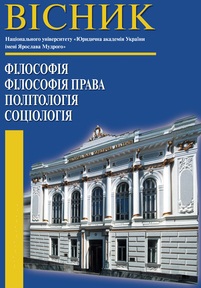ВИКОРИСТАННЯ ЮРИДИЧНОГО ЗНАННЯ ЯК МАТЕРІАЛУ ТЕХНОЛОГІЇ
THE USE OF LEGAL KNOWLEDGE AS A MATERIAL OF TECHNOLOGY
Author(s): Zhanna PavlenkoSubject(s): Philosophy of Law
Published by: Національний юридичний університет імені Ярослава Мудрого
Keywords: technological approach to legal knowledge; innovations in law; intellectual legal systems; expert knowledge; legal start-ups;
Summary/Abstract: Problem setting. Identification and comprehension of ideological and methodological foundations of intellectualization of society, phenomena of resource of knowledge, information resource and information technologies (their types and levels, social and psychological aspects of knowledge movement, peculiarities of legal knowledge, conditions of application, readiness for this society, the role of jurisprudence in innovative processes) is an important and necessary component of radical improvement of national programs, desirable social transformations. Productive development and effective implementation of models of large-scale social transformations of the modern level requires a different approach to legal knowledge and helps to identify ways to effectively develop and implement models of innovative development of Ukraine.Recent research and publications analysis. The results of the research of these problems give an opportunity to note that, in general, the systematic scientific comprehension of the complex, volumetric and multidimensional problem of finding out the uniqueness of the movement of legal knowledge, in particular, their production, accumulation, transformation, translation, processing, presentation, automation, influence on transformation legal norms, jurisprudence and legal education, etc. - is only at an early stage.Paper objectiv. The purpose of this article is to consider certain aspects of the technological approach to legal knowledge based on the results of understanding this issue by various representatives of the humanities and interdisciplinary researchers.Paper main body. The article substantiates that the use of legal knowledge as a material technology affects the development of legal science. The content of the concept “technological approach to legal knowledge” is defined. It is revealed that one of the ways to improve the law can be the active application of innovation. Analyzed the current state of development of innovative and technological components in the law; it is indicated that these projects as a core contain an array of legal knowledge. The features of legal knowledge are highlighted and the analysis of the impact that has to do with legal knowledge as a technology material on the development of jurisprudence is carried out. It is revealed that at the present stage legal knowledge gradually takes the place of one of the weighty components of the array of modern information and technologies circulating in society. It is shown that the philosophical and legal understanding of the technological approach to legal knowledge, taking into account the national specifics of our country, contributes to the identification of ways for effective development and implementation of innovative development models of Ukraine.Conclusions of the research. Methodology of technological attitude to legal knowledge is a complex problem that can be solved on the basis of a constructive dialogue between the developers of artificial intelligence systems and lawyers. The structure of knowledge is fundamentally complex, it contains various facts from the relevant field of law, the interrelationship between them, the rules of action, knowledge of how to include knowledge in the artificial intelligence system. The socio-cultural meaning of the technological approach to legal knowledge is the translation of expert knowledge into the world of society. Submission of legal knowledge in these systems translates the specificity of human knowledge, the features of the relationship of its main levels to the area of actual practical problems that require the attention of scientists, therefore, the prospects for further research in this direction are directly related to the study of the structure of knowledge in the field of law.
Journal: Вісник НЮУ імені Ярослава Мудрого. Серія: Філософія, філософія права, політологія, соціологія
- Issue Year: 40/2019
- Issue No: 1
- Page Range: 137-155
- Page Count: 19
- Language: Ukrainian

